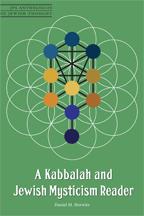
There are those who believe Kabbalah, or Jewish mysticism, is a dangerous pursuit and should be avoided. But Rabbi Daniel Horwitz has a different take on it. So much so that he has written a book titled “A Kabbalah and Mysticism Reader,” published by the Jewish Publication Society.
Rabbi Horwitz, who served Congregation Ohev Sholom in Prairie Village from 1986 to 2004, says while studying at the Spertus Institute of Jewish Learning and Leadership in Chicago he realized a whole field existed that had been neglected in his Jewish education.
He says while growing up in a typical congregational religious school, no one offered any information about Jewish mysticism and he didn’t hear anything about it during his involvement in the Conservative movement’s youth program. Nor did rabbinical school offer Kabbalah as part of its education.
“So I realized I had to get up to speed and ultimately that’s what I did,” he said. “I became particularly interested in a book called ‘The Two Tablets of the Covenant’ written by one of my ancestors in the early 17th century, Rabbi Isaiah Horowitz.”
Although the spelling of the last name is different, Rabbi Horwitz says there’s a strong tradition in the family that they are descended from Rabbi Isaiah Horowitz.
The earlier rabbi’s book is an encyclopedic work of everything Jewish up to 1625 through a kabbalistic lens, Rabbi Horwitz says. After reading this book and studying other aspects of Jewish mysticism, he developed a curriculum for his adult classes at Beth Yeshurun in Houston, where he is a part-time chapel rabbi, a teacher for the Jewish Learning Project of Beth Yeshurun and teaches Melton Adult-Mini School classes through the local Jewish Community Center.
Rabbi Horwitz’s adult learning curriculum eventually became his doctoral project at Spertus, which in turn became his book. He says he feels the book fills a gap.
“There are lots and lots of very academic books about Jewish mysticism and there are also some very non-academic treatments of it — some from, I would say, the religion for profit sector, some from people who don’t know that much about Kabbalah,” he said. “This was an attempt, as with many of JPS’s books, to be something that is both scholarly and accessible. At least that’s been my goal.”
Written for both scholars and lay people, Rabbi Horwitz’s book sends the message that there is a side of Judaism that is not talked about much in America and so people have very little information about it. He wants people to know Jewish mysticism exists.
“There is a whole mystical tradition in Judaism and how it has developed,” the rabbi said. “And then there are the specifics of the book, what role has Jewish mysticism played in the development of Judaism; how has it affected the siddur; how has it affected Jewish rituals?
“And also what does it offer as an answer to some of the big questions. I have a chapter devoted to what Kabbalah says about the problem of evil. And there are some potentially very useful answers. Everyone is going to come to their own conclusions on that subject, but I think this presents some ideas people may not have considered.”
Rabbi Horwitz does point out there are traditions that exist about the dangers of Kabbalah and instruction you should have before studying it. He says there’s a myth about Kabbalah that you shouldn’t be introduced to it before you’re 40 years old, which in Jewish history is relatively late. There was a legitimate concern that if you had not covered some of the basics in Jewish life — if you didn’t know the Bible, if you didn’t know anything about Talmud — you would be rushing into a gray area without the required prerequisites.
“Those cautions are important in our traditions and they are valid,” he said. “Another prerequisite was that a person ought to have a certain degree of maturity before they got invested in the study of mysticism because it was felt that that could take you away from the priorities of day-to-day Jewish life, which the rabbis really didn’t want.
“They didn’t want you to detach from the world entirely. You want to connect with God, but first be rooted in this world and have relationships and family and so forth and then that could be an add-on.”
One of Rabbi Horwitz’s classes at the Jewish Learning Project is “Mystical Experience from the 16th Century On.” Another class is about Judaism and justice from a curriculum the American Jewish University put together. At Melton, he teaches a class in Pirkei Avot (Ethics of our Fathers).
Rabbi Horwitz’s 612-page book is available through Amazon.com for $33.44.
“I’m hoping this work will be of interest to Jews from a variety of backgrounds and that they will give it a look and see,” he said.



